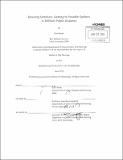Devising seminars : getting to yesable options in difficult public disputes
Author(s)
Hulet, Carri
DownloadFull printable version (17.51Mb)
Alternative title
Getting to yesable options in difficult public disputes
Other Contributors
Massachusetts Institute of Technology. Department of Urban Studies and Planning.
Advisor
Lawrence Susskind.
Terms of use
Metadata
Show full item recordAbstract
For decades, collaboration practitioners have been experimenting with different methods to address "wicked problems" - social policy issues that are impossible to define, affect multiple stakeholders, and must be addressed even though they cannot be solved. One challenge with these difficult issues is generating a range of acceptable options to choose from before decisions are made or processes stalled. This thesis explores an experimental brainstorming method called a "Devising Seminar" to encourage creative option development among influential stakeholders in a private, facilitated setting. The product of the Devising Seminar is a non-attributed summary of the ideas the group generates that is made available to an audience beyond the participants. This method expands on the original Devising Seminar concept, which was first introduced by Roger Fisher at the Program on Negotiation at Harvard Law School. Under the direction of Professor Lawrence Susskind, I managed the Action Research project that informs this thesis. In January 2013, our team of researchers from MIT, Harvard, Universidad Austral de Chile, and the Consensus Building Institute designed and ran an experimental Devising Seminar in Santiago on hydropower conflict in Chile. Representatives from industry, government, and civil society generated a set of options that they or other actors in the conflict could take to ease or resolve their disputes. Based on the research, I conclude that Devising Seminars have the potential to become a standard collaborative method for developing mutually-beneficial options for addressing wicked problems. I argue that stakeholders' potential unwillingness to engage in the creative process poses the biggest challenge to the method, and recommend possible actions that could mitigate the risk. I recommend further experimentation to test the method's effectiveness and impact.
Description
Thesis (M.C.P.)--Massachusetts Institute of Technology, Dept. of Urban Studies and Planning, 2013. Cataloged from PDF version of thesis. Includes bibliographical references (p. 44-45).
Date issued
2013Department
Massachusetts Institute of Technology. Department of Urban Studies and PlanningPublisher
Massachusetts Institute of Technology
Keywords
Urban Studies and Planning.